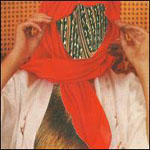
Yeasayer
All Hour Cymbals
(We Are Free; 2007)
By Dom Sinacola | 14 November 2007
Everything at once. That’s exciting, right? A christened chunk of most everything you count on, jerk a knee to, expect and revere in accessible pop music nowadays and in latterdays; disintegrated septum wails and upwardly mobile snowflakes of synth immediately recognizable all over this thing? Sure. Yeasayer sounds so democratically minded, like an assembly of musicians contributing equal mental and emotional responsibility, that I can’t blame it for glutting so fully on everything I hope and dream for in music for which I don’t have to try so hard to get. On “All Hour Cymbals” (a title already announcing its own everything-ness), Said the Gramophone, “It’s got the kitchen sink—and all these things under starlight”; blogs seem to agree, alluding to Peter Gabriel and then Talking Heads and Roxy Music grinding through Animal Collective grinding on Brightblack Morning Light spitting up on the Arcade Fire and Danielson. Mincing words, taking a piss, this stuff’s fun and inevitable because, really, Yeasayer’s a band who owes its bit of limelight to endless waves and ambiguous generations past, to ethnocentric cues and white polyrhythmic grandfathers, to possibly the inventor of the limelight itself. They are a lovely amalgamation of influence, studied and large, and so, unfortunately invulnerable to most criticism. I mean, I’m not about to start crapping on your favorites, and hype doesn’t exactly start at zero.
Most damning then is how overstuffed the record seems. Eager to wring every succulent tone and in-utero melody out of the surgical tray of instruments behind them, the band pulls coquettish wiles through dead-stare conceits. Both “Waiting For the Summer” and “Germs” balk at how, um, Middle Eastern-ly they play around bombastic harmonies, mostly because they seem balls down excited to be using something that sounds regionally other (sitar anyone?). Even “Germs,” coyly, goes so far as to enact both a paean and effigy to George Harrison, immolating legends inside gaudily draped hookah bars. “Sunrise,” similarly, is bent on the exchange between sting and thwomp in the percussion, leaving singer/guitarist Anand Wilder no room but in the middle. Call it a miracle that in the almost-confusion of each almost-inchoate track a piece—be it Wilder’s sincerely reaching vocals or Ira Wolf Tuton’s pastoral bed of clarinets and gummed bass or a staunch power chord clearing the space around it—can distinguish itself from and then direct the whole, and nowhere is this holy Moses confluence more superbly realized than in the single that made the band neo-darlings; “2080,” despite clunky new age lyrics (“I can’t sleep when I think about the times we’re living in / I can’t sleep when I think about the future I was born into”), is mounted on the brackets of its falsetto chorus only to derail the confidence in the bridge, words and arpeggios losing grip to muddle and soften as Wilder screeches sweet, desperate nothings into the Void’s ear. When the band embraces pop cues so effortlessly only to dismantle them, the effect is giddy.
When the band corrals influence without restraint, unifying, yes, “World Music” behind walls and walls of echo effects and ceaseless, processed layers, they just look bruised. “No Need to Worry” pummels itself from the inside, OCD-popping blisters of strident cymbals and horns and then sobering up the bliss with a paint-by-numbers guitar solo. The song is sonic whiplash, insuring catchy snippets and awed wankery in numbers alone, but hedonistically inculcated with sheer tan breadth. Nothing’s catchy because everything’s catchy. And that’s how the album settles, gets comfortable—by never getting comfortable, never feeling homey or lived-in, just eternally at odds with itself.
And sure that’s ambition for you, that kind of internal bleeding, bubbling in its own good-juice. That’s the Brooklyn noise for you, generosity in direct response to the claustrophobic all-art scene. That’s Yeasayer: they will make a great album once they consolidate their “Far Eastern” and “West African” and “Mid-Something” pastiches into a riff that speaks volumes yet reached, into a drum line discernible. Once they get over how talented they all are. Once they set up a dictatorship, they’ll have focus in spades.





